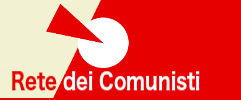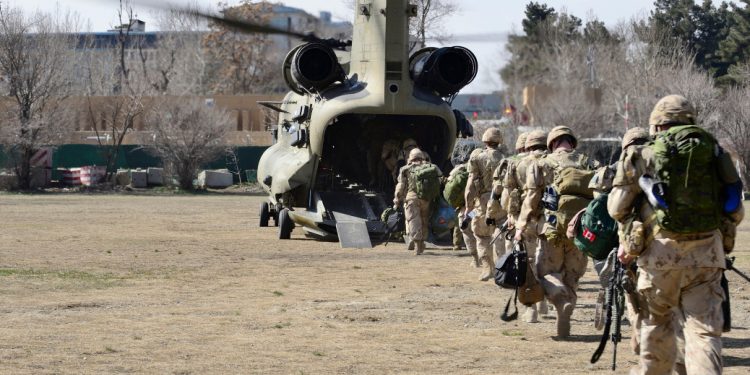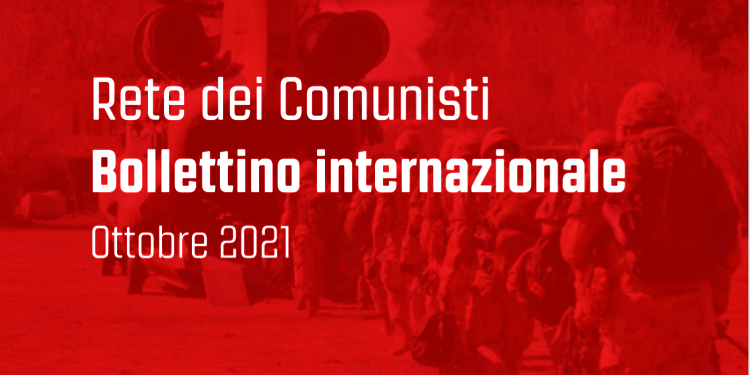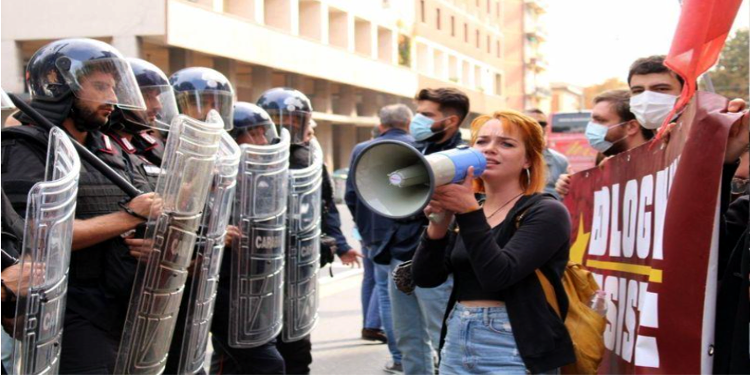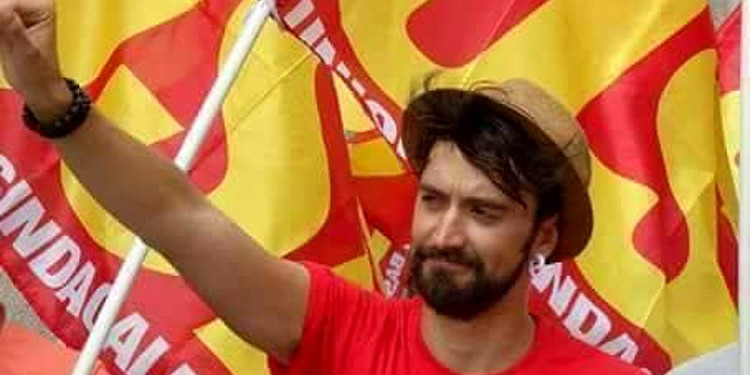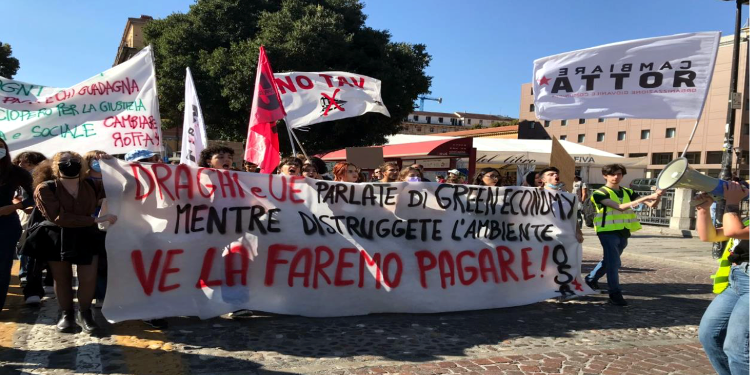| english | español | français | italiano
Editorial of August 25, Mauro Casadio – Rete dei Comunisti
What is happening in Afghanistan cannot be correctly interpreted without going to the political and historical roots that have determined the current situation. Around the tragedy of that people, indecent falsehoods and mystifications have been produced whose main actors have been the USA (followed by European countries since the 1970s), Pakistan and the reactionary rulers of Saudi Arabia. It was in fact President Carter in July 1979, a good six months before the intervention of the USSR, who decided to support the fundamentalists and Pakistan militarily in the war against the Afghan government.
Taking a fiercely critical view of the official versions provided by governments and the ‘ideological apparatuses of the state’, such as television and the mass media in general, is an obligation for a communist force such as ours, because at the height of the anti-Soviet dogma in the 1980s our area, which was then called the Movement for Peace and Socialism, was the only political organisation in Italy to publicly practise internationalist solidarity with the Afghan government.
A government attacked by feudal forces such as the Mullahs, the landowners who saw their power called into question by the socialist reforms that were made in the countryside, social services, schools with literacy, up to the emancipation of all women, banning arranged marriages and the burqa (as was well explained in the article of Contropiano of 22 August entitled “Globalized Monsters” by Leonardo Masone).
Ours was an uncomfortable and isolated position, even by the most radical left, but we supported it with all the necessary determination, being aware that, however, the Soviet intervention could safeguard the social and democratic characteristics of that experience, necessary for the emancipation of the Afghan people.
A very difficult position and a convinced “Kabulist” one, as it was called at the time, but a clear one that today allows us to represent and strengthen a point of view that is now imposed by the facts that are coming to light in this second half of August, blowing up all the lies and mystifications of the imperialist countries, of the US but also of the EU.
The first was that the Afghan government in the 1980s existed thanks only to the USSR. The reality is that that government resisted imperialist and fundamentalist external aggression for a good three and a half years (from 1989 to 1992) after the Soviet withdrawal, showing that it had a strong relationship with important sectors of Afghan society. A very different thing from the current puppet government which, left alone with its own forces, did not even last three weeks, further demonstrating its inconsistency.
Certainly, the Westerners cannot deny that they were well aware of the obscurantist and reactionary characteristics of their allies and that they even encouraged and supported them in an anti-communist key. Therefore, the tears shed on those who are fleeing from the Taliban barbarism appear completely false, and here some reflections are necessary.
The first is that relative to the massacre in ’92 against the communists, their families and all those who defended a progressive social vision against the obscurantism of the mujaheddin. At the time, however, Westerners were quite happy for those massacres to be perpetrated, whether they involved men, women or children, and even drew a veil of silence over it, focusing only on the military defeat.
Nor did they say anything when Afghan President Najibullah was barbarously emasculated and then hanged in the streets in ’96. Even our fine left-wing souls remained silent in the face of an episode that the ‘civilised’ West then repeated with Saddam Hussein and Gaddafi but failed, fortunately, with Syrian President Assad.
The other is that if one has to identify a person responsible for what is happening today in Kabul, it is precisely the West, which first used the integralist wave and is now abandoning its supporters to that barbarity evoked like an improvised sorcerer’s apprentice.
The real danger facing the ‘refugees’ and the collaborationists today is that which comes from the wheels of the American planes as they take off and from fleeing from the allies, no more and no less than what was done in 1975 with the collaborationists in Vietnam, in the face of the now unsustainable and brazen rhetoric in defence of women and children, who are now cynically abandoned to themselves.
In the coming months, we must continue to work on political and historical “counter-information” on the Afghan affair, systematically countering an increasingly less credible neo-colonial ideological operation that since the 1990s has made the masters of the world “dream” that history was truly over.
But while no one should be given a discount for the past, the Afghan affair is the culmination of a sharp reversal in the historical course of the last thirty years. For some years now, it has been clear that the situation is changing radically: from increased global competition, to Britain’s exit from the EU, to the tragedy of the pandemic, which has been most intense in countries where liberalism has devastated the social fabric.
For some time as the RDC we have been working on the analysis of this change and we have done so in particular in two national forums, in 2016 and 2019 on the crisis of capital’s hegemony and the stalemate in the relations of force between imperialisms, in which we identified a historical passage that we defined as being of the same depth as that of the crisis of the USSR, but of the opposite political sign.
In this sense it is necessary to identify – albeit still in an approximate way as a long phase of change is opening – which are the characters that are emerging, both the more evident ones and the less visible but potential ones that may break out in the near future.
Going by points:
a) The defeat is ideological rather than military.
The greatest and most burning defeat for the West is the IDEOLOGICAL one. The shameless use of weapons, in terms of real colonial interventions from the 1990s onwards (to list them would be useless as well as very long), was possible because in those years a general revolutionary vision had capitulated and the so-called humanitarian interventionism, the “endless” war for democracy, etc. had asserted itself.
This allowed the ideological motivation necessary to justify any kind of interference and military intervention towards the outside world, but also to justify to the populations of the imperialist countries the economic expenses and human costs paid to perform a “superior” task, precisely humanitarian.
However, it should not be forgotten that the passivity that has been established in recent decades by the peoples of Western countries was also due to the implicit awareness that these crimes would have allowed the distribution to the “masses” of the crumbs of a generalised robbery towards the countries of the periphery, a “world periphery” that at the time also included China due to the low cost of labour.
The failure in Afghanistan, which came after those in Iraq, Syria, Yemen and many other places including Latin America, puts an end to Western hegemony over the fight for democracy, human rights and women’s rights. The ideological lintel has collapsed and all those civil and military structures that have rested on it for decades will collapse.
b) The material causes of the US defeat
The causes that led to this outcome are political and military, but they are above all material, since the self-appointed policeman of the world did not have the material strength to sustain this role, starting with the weaknesses of its economic and financial structure, which had been taken to its extreme possibilities with the zero interest rate policy and an abnormal overproduction of capital.
A structural weakness and a new historical truth are thus emerging: after barely thirty years of a unipolar world of the USA, it is becoming clear that a single country cannot control the planet, especially in a phase of economic-financial, social and finally environmental crisis that has been going on for more than ten years.
What is emerging is a multipolar world, which will however be subjected to many contradictions and conflicts if it maintains its material basis in the capitalist mode of production, and within which the drive to overcome the present social order could find new vigour.
c) The failure of a ruling class
There is also a failure of strategic conception that demonstrates the limits of the US ruling class. The intervention and control of central Asia was the product of the strategic thinking of Zbigniew Brzezinski, President Carter’s advisor and member of the Trilateral, who theorised the need to occupy the centre of the Asian continent in order to obtain a decisive strategic position in that area away from the US. From there they thought they could condition China, Russia and Iran to maintain their world dominance. This new Vietnam shows how unrealistic such a calculation was.
d) The use of military Keynesianism
Since the Korean War in 1950 in the US, who has had a decisive influence on American international policy has been the military industrial apparatus, i.e. the use of military Keynesianism. It has been decisive because it is the most important production sector, as the US is by far the largest arms producer and exporter in the world.
The recoil that US interventionism is now undergoing, the greater prominence and role of its competitors, not only has a strategic effect but also an economic and therefore social one. In other words, where will this leading sector turn to increase its profits? The internal market, which is still protected and ‘flourishing’, will certainly not be sufficient.
This necessity will produce other chain effects of a different kind: on the one hand, the deepening of an industrial and social crisis that is already weighing heavily on the American economy, and on the other, knowing full well how the ‘beast’ operates, what other war scenarios are being prepared to support the military industrial apparatus?
e) A new international order
It is clear that in the coming months and years a new international order will take shape, perhaps even new relations of force that could break the stalemate of imperialisms that we have analysed and that has been going on for at least a decade, that is, since the previous financial crisis. Understanding what the international scenario will be, proceeding by hypothesis and verification, is not an intellectual exercise of geopolitics but a way to place the initiative of the communists in the perspectives and also, as far as we are concerned, in the specific national situation.
Some signs have already come from a resumption of G7 activism with the recent summit held in June in Cornwall where some previously less obvious strategic choices emerged. Basically, in the face of global competition and the role of China, the growing and diversified ambitions of the allies, and the withdrawal from Afghanistan that had already been foreseen (but certainly not as foreseen as the debacle the world is witnessing), the US but also the EU are taking note of the change in the strategic balance.
They probably consider the loss of direct imperialist control over a large part of Asia and are reorganising the Atlantic area by recompacting NATO, which until a few years ago seemed to be on the way out.
Of course, exact forecasts on this are premature and we can only try to understand the trends, but the idea of consolidating the Atlantic area around the US and the EU, also strengthening its positions in Africa and Latin America, is a hypothesis that was already apparent from the proposal made during the G7 meeting in June, namely that of building a “Western Silk Road”. Of course, the negative result of the G7 on the withdrawal from Kabul should also be considered, but this summit was held in a condition that was clearly unmanageable for NATO forces.
The hypothesis of holding on to the imperialist “citadel” of the Atlantic alliance is all to be verified, but it is the logically most realistic one insofar as relations with China “in primis” but also with Russia are undergoing a very strong attrition.
Significant was the statement of the spokeswoman of the Chinese foreign ministry who said that “wherever the American army goes it leaves turmoil and division, chaos, broken families and devastation”.
If this is the perspective on which the Western powers are working, two questions of a strategic nature will arise, but which have to do with our direct political action as communists in Italy.
The first concerns the role of Latin America within this Atlantic reorganisation. It should be remembered that the attempt to make that continent more functional to the economy of North America was already made in the 1990s, first with the constitution of NAFTA, as an economic trade area, and then with the enlargement to the rest of the continent with the FTAA.
That prospect foundered because China ‘entered’ the market with labour costs and state support for Foreign Direct Investment (FDI) that were more convincing for multinationals than what Latin American countries could offer. It is no coincidence that it was precisely in this situation of relative importance for the USA of the Latin American countries that the Bolivarian political experiments were affirmed, starting with Venezuela, and the ALBA was set up as an alternative economic area.
In the prospective change of the Atlantic area’s newfound centrality, the attention that the US and the EU will pay to those countries will also change. The anti-Cuban campaign we have been witnessing for months, the continuous interference, even with coups, in the policies of countries claiming their economic independence from the robberies of multinationals, are not only the product of anti-communist ideology but of the need to regain control of an area that is moving towards alternative social perspectives. This need concerns North America but also the EU, which systematically associates itself with the US on these campaigns.
The second concerns the relationship between the US and the EU. If it is true that the aim is to strengthen the Atlantic axis, this cannot leave the relationship as it was before, because today it is the US that needs to strengthen its alliance with the EU; Britain alone is not enough. But the EU is no longer willing to play a subordinate and not an “equal” role with the US.
The European imperialist pole has been “forged” over years of continuous crises, and these have always had a reinforcing effect on Brussels, so that the only relationship that can be acceptable today is an equal one. On the other hand, it is the function of the United States that is in crisis, since it is now being demonstrated that it is not capable of supporting the fate of the world on its own.
Furthermore, the EU, unlike the US, has the possibility of using the “two ovens”, so that if the US does not accept a change in relations, the alternative of economic relations with China is already on the table. And it is precisely this contradiction that both China and Russia are working on. This option is clearly visible in the declarations of the EU and the main European states, which differ from those of the US and Great Britain.
Naturally, the conditions that will be determined, the concrete choices that will be made, and the further changes in the relations of force between the powers will count for a great deal in the hypothesized scenarios. However, what needs to be understood now is the process that will be set in motion by the present upheavals, but which will take on forms that are difficult to predict in the coming years.
As the Rete dei Comunisti, we believe that the spaces to fight for a political and social alternative will increase. In any case, two areas of political and ideological battle that we have been following for some time are confirmed: that of internationalism, in particular towards the experiences of 21st century socialism that are developing in Latin America, and that of the rupture of the European Union understood as an imperialist pole, which paradoxically finds stronger reasons for the construction of a competitive political and economic area in the crisis in the USA.
(Published in Italian on August 25, 2021)
